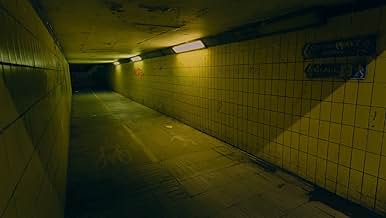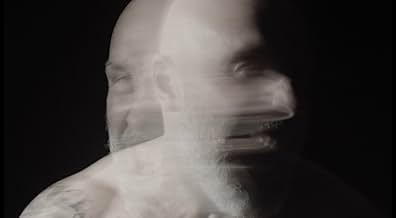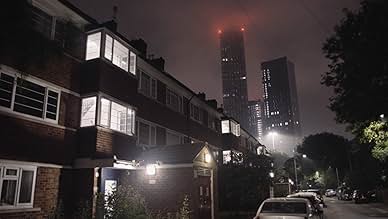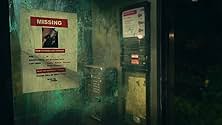Ajouter une intrigue dans votre langueThis multi award-winning British feature film follows a grieving ex-English teacher as he takes us on a personal journey through Broken Britain under Margaret Thatcher in the 1980s, John Maj... Tout lireThis multi award-winning British feature film follows a grieving ex-English teacher as he takes us on a personal journey through Broken Britain under Margaret Thatcher in the 1980s, John Major in the 1990s and Boris Johnson in the 2020s.This multi award-winning British feature film follows a grieving ex-English teacher as he takes us on a personal journey through Broken Britain under Margaret Thatcher in the 1980s, John Major in the 1990s and Boris Johnson in the 2020s.
Avis en vedette
I love off the wall films and this was certainly visionary - as reviewed by others - but it left me feeling bored and watching the clock.
Monologue works better in Alan Bennett's Talking Heads, where the scripts are more tightly written, and the story arcs more accessible.
The dialogue feels very written rather than spoken and therefore quite unnatural, unlike in Shane Meadows' nominally comparable films where adlibbing creates a feeling of authenticity.
Plot is almost entirely absent and, while I can appreciate that plot is often prioritised over character in mainstream film making, I personally need more of what I would call plot (and call back) to maintain my interest.
The casting was good but the middle actor is very 'theatrical' in his delivery, and I couldn't suspend my disbelief. The older jack's drunken scene towards the end was a fantastic peice of acting.
Overall, I would say that, while very worthy, and absolutely correct in its themes of modern British degradation, it was a film that I would not watch again, and not recommend except to a technical audience, who would no doubt find much of interest in its unusual execution, for better and worse.
I know I'm vastly outnumbered in my relatively negative opinion, but I still deserve to exist.
Monologue works better in Alan Bennett's Talking Heads, where the scripts are more tightly written, and the story arcs more accessible.
The dialogue feels very written rather than spoken and therefore quite unnatural, unlike in Shane Meadows' nominally comparable films where adlibbing creates a feeling of authenticity.
Plot is almost entirely absent and, while I can appreciate that plot is often prioritised over character in mainstream film making, I personally need more of what I would call plot (and call back) to maintain my interest.
The casting was good but the middle actor is very 'theatrical' in his delivery, and I couldn't suspend my disbelief. The older jack's drunken scene towards the end was a fantastic peice of acting.
Overall, I would say that, while very worthy, and absolutely correct in its themes of modern British degradation, it was a film that I would not watch again, and not recommend except to a technical audience, who would no doubt find much of interest in its unusual execution, for better and worse.
I know I'm vastly outnumbered in my relatively negative opinion, but I still deserve to exist.
Rare, to find a film like this that is so nauseatingly intrusive on how we currently behave and live, under a fallen empire, sank by avarice and false nationalism.
It's clear to see this was done on a small budget, which admittedly took me time to adjust to and actively engage with the genius monologue driven writing that is on show, reminiscent of the agonising theatre of cruelty or Dreyer's 'Ordet'
I would of liked to have experienced more of the child actor, witnessed more of the narrative from his perspective I think would of shinned a more empathetic light on this piece. However, the monologue delivered by this child star is something I can't recall having been achieved at this level.
I may do an extended review in the future, but I can only recommend this unique indie film to all aspiring and currently struggling academics and filmmakers.
It's clear to see this was done on a small budget, which admittedly took me time to adjust to and actively engage with the genius monologue driven writing that is on show, reminiscent of the agonising theatre of cruelty or Dreyer's 'Ordet'
I would of liked to have experienced more of the child actor, witnessed more of the narrative from his perspective I think would of shinned a more empathetic light on this piece. However, the monologue delivered by this child star is something I can't recall having been achieved at this level.
I may do an extended review in the future, but I can only recommend this unique indie film to all aspiring and currently struggling academics and filmmakers.
- DO.
When you look closely at Hieronymus Bosch's works, you'll see a slew of tiny, tucked-away micro-portraits. Religious allusions, eroticized violence, and references to heaven and hell are only some of the elements that made Bosch's art such a bizarre tapestry of sin and transcendence.
Why, you might wonder, am I referring to a 16th-century Dutch artist in the context of a film review? The explanation is simple: 'Nobody Loves You and You Don't Deserve to Exist' is a complicated code of enigmatic imagery that illuminates a link between conservative Britain and the late-medieval currents of heaven and hell.
This bold assertion is reinforced from the outset by a horrific, yet elegantly delicate medieval composition that walks us as the spectator through each micro-portrait of Bosch's "The Garden of Earthly Delights." The storyline of this film is found in the geography of medieval music. Given the prevalence of travel, pilgrimage, exile, peregrinations, and the like throughout this time, "Jack," the working-class jester disturbed by the mind of a tortured saint, is no exception. In a similar vein to Barry Unsworth or Emilio de' Cavalieri's works, the reader is immersed in the life of an outsider, in this case a whole gallery of classic medieval archetypes and relative outsiders in their own right, as they are only revealed to the audience in theatre-like extensive monologues delivered to them directly in a genius blend of performance and interview, I found myself constantly asking who is the interviewer? But, that question is not something that requires a definitive answer.
Information is pieced together through the murmurs of women, most of whom appear to have little moral culpability for Jack, except for the closing speech, which connects with the remorse we feel after the fact, when it's too late to alter anything. This is further kept together by a god-like narrator recounting to us Jack's wonders and woes, along with fantastic gothic imagery scattered with brutalist and increasingly modernist architecture, which appears to move away from purity as the tale proceeds.
To expand on this final point, I take away from this film the harmful and immoral stupidity that has steadily engulfed the now-isolated former United Kingdom. Brett Gregory, the director/writer, also thoughtfully and efficiently adapts each chaotic pane of Bosch's painting into its own narrative act, a challenging feat to do but one that rarely failed to astound me.
In short summary, excellent writing and a fresh plot, with some wonderful characters and a vivid direction, respectfully paying due to the world of art and literature alike.
Why, you might wonder, am I referring to a 16th-century Dutch artist in the context of a film review? The explanation is simple: 'Nobody Loves You and You Don't Deserve to Exist' is a complicated code of enigmatic imagery that illuminates a link between conservative Britain and the late-medieval currents of heaven and hell.
This bold assertion is reinforced from the outset by a horrific, yet elegantly delicate medieval composition that walks us as the spectator through each micro-portrait of Bosch's "The Garden of Earthly Delights." The storyline of this film is found in the geography of medieval music. Given the prevalence of travel, pilgrimage, exile, peregrinations, and the like throughout this time, "Jack," the working-class jester disturbed by the mind of a tortured saint, is no exception. In a similar vein to Barry Unsworth or Emilio de' Cavalieri's works, the reader is immersed in the life of an outsider, in this case a whole gallery of classic medieval archetypes and relative outsiders in their own right, as they are only revealed to the audience in theatre-like extensive monologues delivered to them directly in a genius blend of performance and interview, I found myself constantly asking who is the interviewer? But, that question is not something that requires a definitive answer.
Information is pieced together through the murmurs of women, most of whom appear to have little moral culpability for Jack, except for the closing speech, which connects with the remorse we feel after the fact, when it's too late to alter anything. This is further kept together by a god-like narrator recounting to us Jack's wonders and woes, along with fantastic gothic imagery scattered with brutalist and increasingly modernist architecture, which appears to move away from purity as the tale proceeds.
To expand on this final point, I take away from this film the harmful and immoral stupidity that has steadily engulfed the now-isolated former United Kingdom. Brett Gregory, the director/writer, also thoughtfully and efficiently adapts each chaotic pane of Bosch's painting into its own narrative act, a challenging feat to do but one that rarely failed to astound me.
In short summary, excellent writing and a fresh plot, with some wonderful characters and a vivid direction, respectfully paying due to the world of art and literature alike.
This is a mysterious, monologue-fuelled masterpiece filmed on a shoestring in the heart of gritty Manchester and beyond. Great writing, visuals, direction and performances, all round.
This is a difficult film to examine since it appears to defy interpretation, and even on interpretation I feel as though there is a little something for everybody to take away from this unique indie arthouse attack.
The entire sensation is channelled through a fascinating collection of pieces to camera, ranging from the painfully poignant Reuben Clarke recounting his abuse to Wendy Patterson's frustratingly soul-crushing authority, who is a perfect portrayal of the robotic kafka-esque bureaucrats who care not for creativity and freedom.
One of the few films that genuinely achieves the dreamy feeling that many claim to have. The slowness of the introduction, the bridging of the narrative as it fades in and out, and the impression the camera provides us as the viewer's eyes, with no control over where you're going all set the setting for a mesmerizingly bizarre experience that can only be compared to a dream. Similarly, dreams may be interpreted in a variety of ways.
I'd recommend giving this a watch if you are able to find it outside of Manchester.
The entire sensation is channelled through a fascinating collection of pieces to camera, ranging from the painfully poignant Reuben Clarke recounting his abuse to Wendy Patterson's frustratingly soul-crushing authority, who is a perfect portrayal of the robotic kafka-esque bureaucrats who care not for creativity and freedom.
One of the few films that genuinely achieves the dreamy feeling that many claim to have. The slowness of the introduction, the bridging of the narrative as it fades in and out, and the impression the camera provides us as the viewer's eyes, with no control over where you're going all set the setting for a mesmerizingly bizarre experience that can only be compared to a dream. Similarly, dreams may be interpreted in a variety of ways.
I'd recommend giving this a watch if you are able to find it outside of Manchester.
Meilleurs choix
Connectez-vous pour évaluer et surveiller les recommandations personnalisées
Détails
- Date de sortie
- Pays d’origine
- Site officiel
- Langue
- Lieux de tournage
- société de production
- Consultez plus de crédits d'entreprise sur IMDbPro
- Durée1 heure 38 minutes
- Couleur
Contribuer à cette page
Suggérer une modification ou ajouter du contenu manquant













